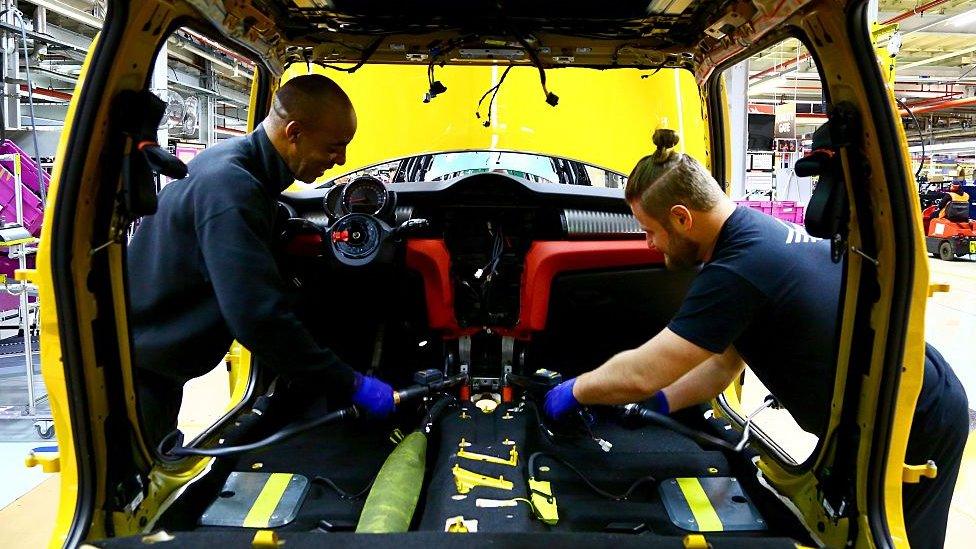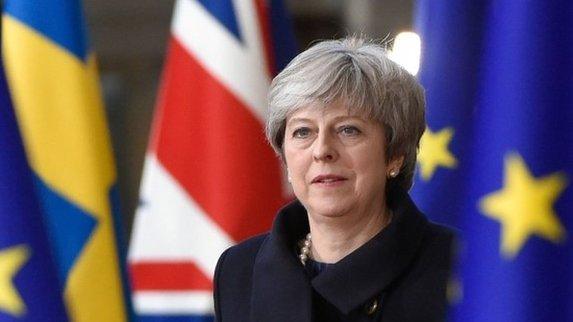Brexit services plan will speed up relocation, says Lloyd's boss
- Published
Lloyd's of London chief executive Inga Beale criticises Brexit White Paper
The Lloyd's of London chief says the government's plan for relations with the EU after Brexit will speed up the departure of firms from the UK.
Inga Beale told the BBC the White Paper would see the 300-year old insurance market go "full speed ahead" to set up its subsidiary in Brussels - and spur others on as well.
Service sector groups say the plan will affect employment and is a "real blow".
However, non-services groups were more positive.
Services, including banks, insurance companies and investment firms, make up 80% of the UK economy and are one of its most successful exports to the EU.
The government wants UK financial services in future to adopt a beefed-up version of a system already used by certain non-EU countries, including the US, Japan and China, whereby they agree to meet certain EU rules to keep access to the bloc.
These rules are equivalent to each other in some areas.
Ms Beale, the chief executive of Lloyd's, said: "Professional and financial services are really not catered for at all and it's very disappointing. We make up basically 80% of the economy of the UK.
"Lloyd's is to open a subsidiary in Brussels so we will be full steam ahead, and many other banks, insurers and other financial services firms will be moving at pace now."
She said the plans would have a real impact: "We will no longer be licensed to write business or offer insurance within the EU 27 and this can get right down to personal protection.
"If you've got insurance for your pet and you like to travel to the continent for a holiday, there's a question as to whether your policy will cover you - so this is really serious stuff."
Huw Evans, director-general of the Association of British Insurers, said: "Whatever the final outcome, the insurance industry is too important to be a rule taker.
"Having to comply with financial regulations we have no say over would be the worst possible scenario for our world leading insurance sector, so we will look to the government to negotiate a better outcome than this."
The City of London Corporation, which governs London's financial district, said dropping the push for mutual recognition for so-called "equivalence" would curb business opportunities with European counterparts and was a "real blow".


Analysis:
Kamal Ahmed, BBC economics editor
It seems the government has made a calculation. If there is no agreement on regulatory alignment on goods, chaos at the ports - and economic damage - could ensue.
Essential supply chains - such as those used to produce millions of cars - will be disrupted.
And there will be no solution to the "no hard border" on the island of Ireland. That has to be headed off.
On services, the risks are less clear. In sectors such as finance, law and legal - Britain is a global leader, the government says.
As such, its services enjoy high levels of global demand and the government believes Britain can make progress on services trade deals outside the EU,

'Step forward'
TheCityUK, the professional services lobby group, called the proposals for services "regrettable and frustrating".
Trade association UK Finance said that simply relying on existing equivalence arrangements would not provide financial institutions with effective market access, but it said the government was right to seek to strengthen and expand equivalence rules.
Other industry groups hailed the paper as progress.
The EEF, which represents major manufacturers, called it a "very positive and constructive step forward" but said more work was needed.
The CBI welcomed the plans and said "protecting jobs and investment now and in future should be the guiding star for both sets of negotiators".
The British Chambers of Commerce called it a "welcome starting point" for businesses.

What's the difference between equivalence and mutual recognition?
One rationale for Brexit is that the UK can adopt its own standards and regulations. But to ensure frictionless trade, it also wants to have these standards recognised automatically by the EU. That is called "mutual recognition" and to the EU it is having your cake and eating it as well - and therefore unacceptable.
With equivalence, the EU would decide that UK regulations in a specific area achieve the same regulatory objectives even if they do not follow the exact same EU laws.
However, the EU assesses whether that third country meets its standards industry by industry, and approval can be withdrawn at very short notice.
Settling for equivalence for services (including financial services) will therefore be unpopular with many companies that had hoped the Treasury, which was campaigning hard for mutual recognition, would fight their corner.
- Published12 July 2018
- Published13 July 2018

- Published12 July 2018